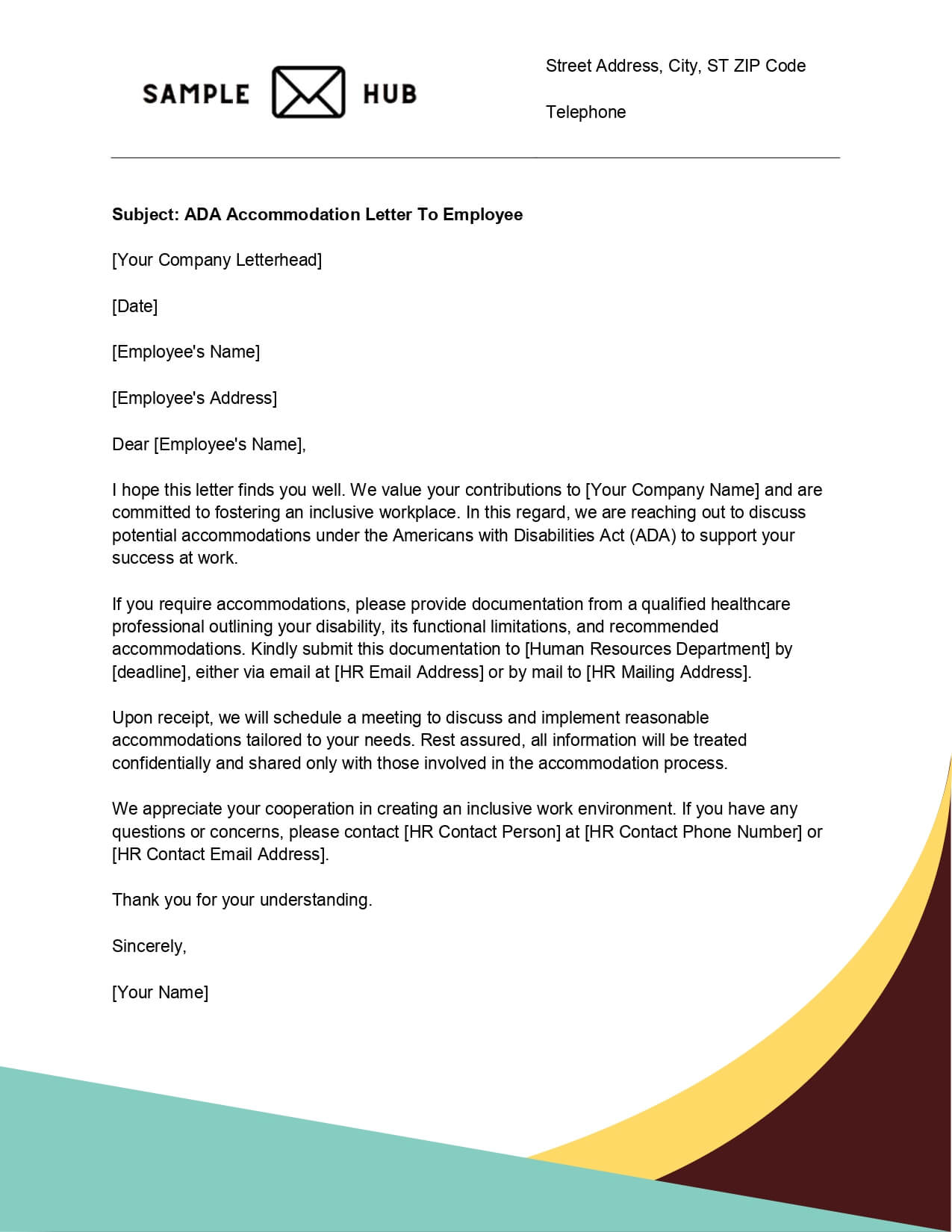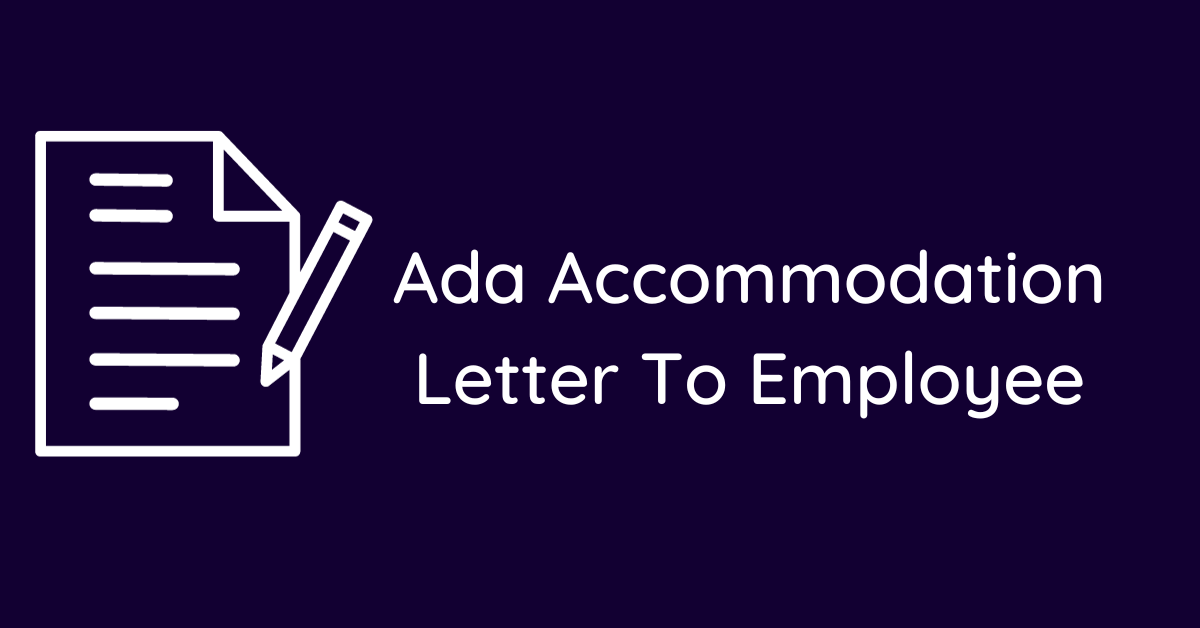Are you an employer who wants to ensure that your employees with disabilities are provided with the necessary accommodations to perform their job duties? If so, you may need to provide an Ada Accommodation Letter To Employee.
This letter is a formal document that outlines the accommodations that will be provided to an employee with a disability under the Americans with Disabilities Act (ADA). The purpose of this letter is to ensure that the employee is able to perform their job duties to the best of their ability, without any unnecessary barriers.
In this blog article, we will provide you with templates, examples, and samples of Ada Accommodation Letter To Employee.
These resources will make it easy for you to write a letter that meets the requirements of the ADA and ensures that your employees with disabilities are provided with the necessary accommodations.
Whether you are a small business owner or a human resources professional, these resources will help you to create a letter that is clear, concise, and effective.
Our goal is to make the process of writing an Ada Accommodation Letter To Employee as easy as possible for you.
We understand that this can be a complex and confusing process, but with our templates, examples, and samples, you will be able to create a letter that meets all of the necessary requirements.
So, let’s get started and ensure that your employees with disabilities are provided with the accommodations they need to succeed in the workplace.
ADA Accommodation Letter To Employee
Dear [Employee’s Name],
We hope this letter finds you well. After careful consideration, we have reviewed your request for accommodation under the Americans with Disabilities Act (ADA).
We are committed to providing a work environment that is inclusive and accessible to all employees. In response to your request, we are pleased to inform you that your request for accommodation has been approved.
The following accommodations will be implemented effective immediately:
- [Specify Accommodation 1]
- [Specify Accommodation 2]
- [Specify Accommodation 3]
If you have any questions or concerns regarding these accommodations, please do not hesitate to contact our Human Resources department.
We appreciate your dedication and contributions to our organization, and we look forward to supporting your success in the workplace.
Sincerely,
[Your Full Name]
Reasonable Accommodation Letter From Doctor To Employer
Dear [Employer’s Name],
I am writing to inform you that my patient, [Employee’s Name], is under my care and has a medical condition that requires reasonable accommodation in the workplace under the Americans with Disabilities Act (ADA).
[Employee’s Name] has the following medical condition: [Specify Medical Condition]. This condition may impact [his/her] ability to perform certain job functions without appropriate accommodations.
Based on my professional opinion and in consideration of [his/her] medical condition, I recommend the following reasonable accommodations:
- [Specify Accommodation 1]
- [Specify Accommodation 2]
- [Specify Accommodation 3]
These accommodations will assist [Employee’s Name] in effectively performing [his/her] duties while accommodating [his/her] medical needs. I believe that implementing these accommodations is essential to ensure [his/her] well-being and continued productivity in the workplace.
If you have any questions or need additional information, please do not hesitate to contact me at [Your Contact Information]. I am available to discuss [Employee’s Name]’s medical condition and the recommended accommodations further.
Thank you for your attention to this matter. I appreciate your cooperation in providing a supportive and accessible work environment for [Employee’s Name].
Sincerely,
[Doctor’s Full Name]
Letter Of Accommodation For Work
Dear [Employer’s Name],
I am writing to request reasonable accommodations for [Employee’s Name] in the workplace due to [his/her] medical condition. It has come to my attention that [he/she] requires specific adjustments to perform [his/her] duties effectively.
[Employee’s Name] has the following medical condition: [Specify Medical Condition]. This condition may impact [his/her] ability to perform certain job functions without appropriate accommodations.
After consulting with [his/her] healthcare provider, it has been recommended that the following accommodations be considered:
- [Specify Accommodation 1]
- [Specify Accommodation 2]
- [Specify Accommodation 3]
These accommodations will enable [Employee’s Name] to continue contributing effectively to the team while ensuring [his/her] health and well-being. I believe that implementing these changes is crucial to maintain a positive and inclusive work environment.
If you have any questions or need additional information, please feel free to contact [Employee’s Name] or [his/her] healthcare provider. Your cooperation in this matter is highly appreciated.
Thank you for your understanding and support in making the necessary accommodations for [Employee’s Name].
Sincerely,
[Your Full Name]
ADA Accommodation Approval Letter To Employee
Dear [Employee’s Name]
I am writing to inform you that your request for accommodation under the Americans with Disabilities Act (ADA) has been carefully considered. After thorough review and consultation, we are pleased to approve the following accommodations:
- [Specify Accommodation 1]
- [Specify Accommodation 2]
- [Specify Accommodation 3]
These accommodations aim to ensure that you can perform your job responsibilities effectively and maintain a positive work environment. We appreciate your proactive approach in providing the necessary documentation and information to support your request.
Should you have any concerns or require further assistance, please do not hesitate to reach out to [HR Contact/Supervisor’s Name] at [HR Contact/Supervisor’s Email] or [HR Contact/Supervisor’s Phone Number].
Thank you for your commitment to your work, and we look forward to supporting you in your continued success within the company.
Sincerely,
[Your Full Name]
ADA Accommodation Denial Letter To Employee
Dear [Employee’s Name]
We appreciate your recent request for accommodation under the Americans with Disabilities Act (ADA). After careful consideration and review of the information provided, we regret to inform you that your request for the following accommodation(s) has been denied:
- [Specify Accommodation 1]
- [Specify Accommodation 2]
- [Specify Accommodation 3]
Our decision is based on [reasons for denial]. We understand the importance of a supportive work environment, and we are open to discussing alternative solutions that may address your needs while considering the operational requirements of the company.
If you have additional information or would like to discuss this matter further, please contact [HR Contact/Supervisor’s Name] at [HR Contact/Supervisor’s Email] or [HR Contact/Supervisor’s Phone Number].
We appreciate your understanding and cooperation in this matter.
Sincerely,
[Your Full Name]

How to Write an ADA Accommodation Letter to Employee
The Americans with Disabilities Act (ADA) is a federal law that prohibits discrimination against individuals with disabilities. As an employer, it is your responsibility to provide reasonable accommodations to employees with disabilities.
One way to do this is by writing an ADA accommodation letter to your employee. In this article, we will discuss the steps you need to take to write an effective ADA accommodation letter.
1. Understand the ADA
Before you start writing the letter, it is important to understand the ADA and its requirements. The ADA defines a disability as a physical or mental impairment that substantially limits one or more major life activities.
The law requires employers to provide reasonable accommodations to employees with disabilities, unless doing so would cause undue hardship.
2. Identify the Employee’s Needs
The next step is to identify the employee’s needs. Talk to the employee and ask them what accommodations they need to perform their job duties. You may also need to consult with medical professionals or other experts to determine what accommodations are appropriate.
3. Explain the Accommodations
Once you have identified the accommodations, you need to explain them in the letter. Be specific about what accommodations you are providing and how they will help the employee perform their job duties. You may also want to include a timeline for when the accommodations will be implemented.
4. Address Any Concerns
If you have any concerns about the accommodations, address them in the letter. For example, if you are concerned about the cost of the accommodations, explain why they are necessary and how they will benefit the company in the long run.
5. Reiterate Your Commitment to the ADA
In the letter, reiterate your commitment to the ADA and your obligation to provide reasonable accommodations to employees with disabilities. This will help to build trust with the employee and show that you are taking their needs seriously.
6. Provide Contact Information
Provide contact information in the letter so that the employee can reach out to you if they have any questions or concerns. This will help to ensure that the accommodations are implemented smoothly and that the employee feels supported.
7. Keep a Copy of the Letter
Finally, make sure to keep a copy of the letter for your records. This will help to ensure that you are in compliance with the ADA and that you have a record of the accommodations that were provided.
What is an ADA accommodation letter?
An ADA accommodation letter is a document that an employee with a disability can request from their employer to outline the accommodations they need to perform their job duties.
This letter is protected under the Americans with Disabilities Act (ADA) and serves as a legal document to ensure that the employee’s rights are protected.
How should an employee request an ADA accommodation letter?
To request an ADA accommodation letter, an employee should first inform their employer of their disability and the accommodations they need to perform their job duties.
This can be done through a conversation with their supervisor or by submitting a written request. The employer may then request medical documentation to support the employee’s request.
Once the request is approved, the employer will provide the employee with an ADA accommodation letter outlining the approved accommodations.
FAQs About ADA Accommodation Letter to Employee
1. Who is eligible for an ADA accommodation letter?
Employees with disabilities who require accommodations to perform their job duties are eligible for an ADA accommodation letter. The ADA defines a disability as a physical or mental impairment that substantially limits one or more major life activities.
2. How should an employee request an ADA accommodation letter?
An employee should request an ADA accommodation letter by notifying their employer of their disability and the accommodations they require to perform their job duties. This request should be made in writing and should include any relevant medical documentation.
3. What if an employer denies an employee’s request for an ADA accommodation letter?
If an employer denies an employee’s request for an ADA accommodation letter, the employee may file a complaint with the Equal Employment Opportunity Commission (EEOC) or pursue legal action. It is important for employees to understand their rights under the ADA and to seek legal advice if necessary.
4. Can an ADA accommodation letter be modified or updated?
Yes, an ADA accommodation letter can be modified or updated if the employee’s needs change or if the accommodations provided are not effective. It is important for employers to work with employees to ensure that their accommodations are meeting their needs.
5. What are the benefits of an ADA accommodation letter?
An ADA accommodation letter can help ensure that employees with disabilities are able to perform their job duties and participate fully in the workplace. It can also help employers avoid discrimination claims and improve employee morale and productivity.
Related:
- Letters To The President ( 5 Samples )
- Letter To The Bride Book ( 5 Samples )
- Authorization Letter To Bank ( 5 Samples )
- Day care Welcome Letter To Parents ( 5 Samples )
- Letter Of Appeal To Insurance ( 5 Samples )

